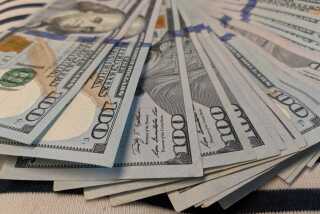Implications of a Rising Dollar on Investments
When something goes in one general direction for 10 years--say, like the dollarâs fall in value against the Japanese yen--the safest assumption to make is that the trend will continue forever. Why fight it?
That at least partly explains why so many Wall Streeters are having trouble believing that the dollarâs rebound, from its historic low of 80 yen in April to just over 90 yen now, is more than a temporary aberration.
But what if the dollar has turned for good? Many investors might have to rethink their expectations for stock and bond markets worldwide. Even money managers who profess to believe that currency fluctuations are just so much noise would be forced to stop and consider how a rising dollar could help or hurt their current portfolios. New winners, new losers could emerge quickly.
The dollarâs latest rally, a 3.3% rise against the yen on Wednesday, came on the heels of the Japanese governmentâs surprise announcement that it will change accounting and other rules to encourage more foreign investment by Japanese institutional investors.
Theories abounded as to what, exactly, the Japanese government is up to. The official line from Tokyo, of course, was that Japan wants a weaker yen to restore some of the competitive edge Japanese companies have lost as the strong yen has squeezed the countryâs export machine.
If Japan begins exporting capital in a big way again--recycling its trade surplus wealth--the yen should dive because institutional investors will be selling yen to buy other currencies.
In the process, those investors will get capital moving once again within the calcifying, bad-loan-burdened Japanese banking system, says Bluford Putnam, chief markets strategist at Bankers Trust Co. in New York.
*
And that is by far the Japanese governmentâs more important objective, he argues. âThereâs only one way to fix the Japanese banking system, and thatâs to flood it with money,â thereby making skittish lenders more willing to extend new loans and make new investments, Putnam says. Fresh profits can cover old losses.
Sound familiar? âThatâs exactly parallel with what the Federal Reserve didâ in the early â90s, Putnam notes, when the central bank slashed short-term interest rates and re-liquefied the troubled American banking system.
One big bull on Japan is Barton Biggs, the well-known investment strategist for Morgan Stanley & Co. in New York. For the last two months he has been telling clients that the yenâs strength has peaked and that the Japanese stock market is a screaming buy. The recent talk of depression and financial collapse in Japan, Biggs insists, is a classic sign of a market bottom.
In Santa Monica, hedge-fund manager Mark Strome also strongly believes that the yen will continue to weaken. Changes in government policy such as those announced in Japan this week, Strome says, âAlways come after the fundamentals have already turned,â in this case against the yen.
While many analysts doubt that Japanese insurance companies and other investors will ramp-up foreign investment again--after being burned for years overseas as the strong yen devalued their foreign holdings--Strome thinks otherwise. âThere is such a herd mentality there that when one investor makes money [overseas], and others see it, theyâll do it too,â he says.
Just in the move from 80 to 90 yen to the dollar, a Japanese investorâs U.S. securities have automatically appreciated 12.5%.
Yet some analysts believe the initial investment push by Japanese institutions will be in Europe rather than in America. Bonds of most European countries yield more than U.S. bonds, and the German mark--Europeâs key currency--is perceived as a safer store of value than the dollar.
If Japanese money flows into Europe, interest rates there could fall, which would naturally be good for European stocks as well.
Indeed, it may not be a coincidence that many foreign stock markets have risen sharply since mid-May--when the yen began to slide--after treading water for much of winter and spring. And most other foreign currencies havenât even weakened against the dollar so far.
Bill Wilby, manager of the Oppenheimer Global stock mutual fund in New York, says a turn in the dollar should mean that export-oriented European and Japanese stocks will do âquite wellâ going forward, while export-oriented U.S. stocks--Wall Streetâs leaders in this yearâs big rally could fade, at least temporarily.
Even allowing for the devaluation effect of a stronger dollar on U.S. investorsâ foreign holdings, Wilby thinks the performance of European and Japanese stocks could be good enough over the next six months or so to make them on balance better investments than U.S. stocks.
(BEGIN TEXT OF INFOBOX / INFOGRAPHIC)
Getting Better
Foreign stock market returns for U.S. investors have mostly improved sharply since mid-May, when the dollar began to rebound against the Japanese yen.
Year-to-date change in dollars: *--*
Stock market As of May 9 As of Tues. Australia +3.6% +7.1% Britain +6.8% +14.0% Canada +5.8% +12.6% France +17.6% +16.8% Germany +9.7% +19.0% Hong Kong +2.6% +11.8% Japan +4.6% -3.5% Singapore +0.6% +0.4% Spain +15.5% +21.2% United States +14.3% +22.3%
*--*
Source: Morgan Stanley Capital Intl.
More to Read
Inside the business of entertainment
The Wide Shot brings you news, analysis and insights on everything from streaming wars to production â and what it all means for the future.
You may occasionally receive promotional content from the Los Angeles Times.










